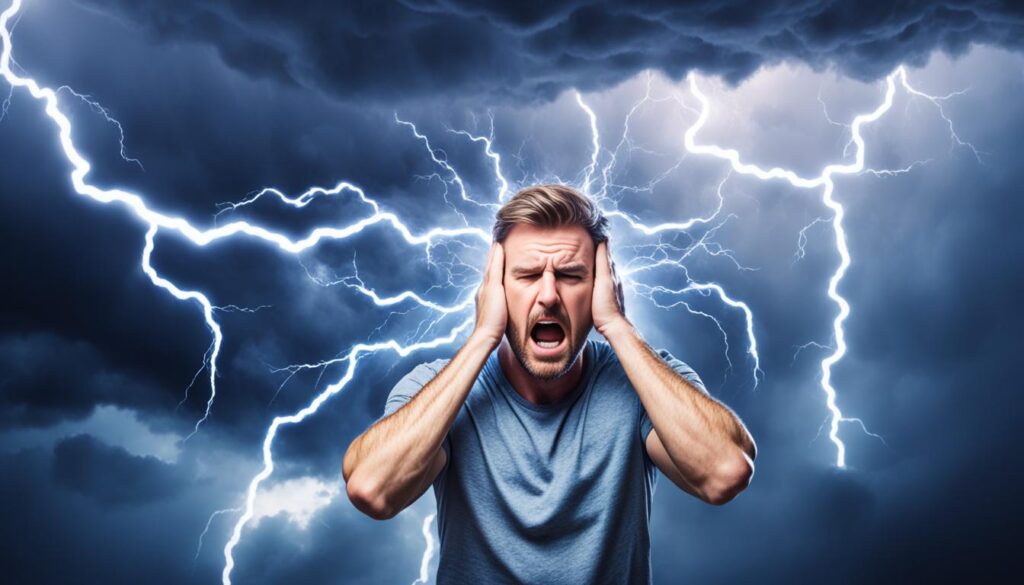Water fasting is a popular practice that involves abstaining from food for extended periods. While it has various health benefits, it can also lead to certain side effects, including headaches. In this article, we will explore the causes of water fasting headaches and provide effective relief strategies.
Key Takeaways:
- Water fasting can cause headaches due to low blood sugar, dehydration, and potential caffeine withdrawal.
- Preventive measures such as proper hydration, gradual adjustment to fasting, balanced meals, and managing stress levels can alleviate and prevent fasting headaches.
- Staying hydrated, consuming electrolyte water, and applying cold or warm compresses can provide relief for fasting headaches.
- When practicing intermittent fasting, adjusting fasting schedules and ensuring balanced meals during eating windows can help manage headaches.
- Consulting a healthcare professional is recommended if fasting headaches persist or become severe.
Causes of Fasting Headaches
Fasting headaches can be caused by a variety of factors. One possible cause is low blood sugar, also known as hypoglycemia. When the body does not receive enough glucose from food, it can result in headaches. Dehydration is another common cause of fasting headaches, as fasting can lead to fluid loss. Caffeine withdrawal is also linked to fasting headaches, although it is not a primary cause. Other factors that may contribute to fasting headaches include electrolyte imbalances, stress, and changes in sleep patterns. The exact cause can vary from individual to individual, and it is important to address these underlying factors to prevent and manage fasting headaches.
Low Blood Sugar and Fasting Headaches
Hypoglycemia, or low blood sugar, can occur during fasting when the body’s glucose levels drop too low. Glucose is the primary source of energy for the brain, and when it becomes limited, it can lead to headaches. The brain relies on a steady supply of glucose to function optimally, so when glucose levels are depleted, it can trigger headaches. It is important to maintain a balanced diet and ensure adequate glucose intake during eating windows to prevent low blood sugar and associated headaches.
Dehydration and Fasting Headaches
During fasting, the body may experience fluid loss through increased urine production and sweat. If not properly hydrated, dehydration can occur and contribute to headaches. Dehydration can lead to a decrease in blood volume, which affects the delivery of oxygen and nutrients to the brain, triggering headaches. Staying hydrated by drinking water and electrolyte fluids during fasting periods is crucial to prevent dehydration-related headaches.
Caffeine Withdrawal and Fasting Headaches
For individuals who regularly consume caffeine, fasting can lead to caffeine withdrawal, which can cause headaches. Caffeine is a stimulant that constricts blood vessels in the brain. When caffeine intake abruptly stops, the blood vessels dilate, leading to headaches. Gradually reducing caffeine intake prior to fasting can help minimize withdrawal symptoms and associated headaches. However, it is important to note that caffeine withdrawal alone is not a primary cause of fasting headaches and is often secondary to other factors.
Other Factors Contributing to Fasting Headaches
In addition to low blood sugar, dehydration, and caffeine withdrawal, there are other factors that may contribute to fasting headaches. Electrolyte imbalances, due to a lack of proper nutrients during fasting, can disrupt the body’s fluid balance and lead to headaches. Stress and changes in sleep patterns, such as altered sleep-wake cycles during fasting, can also trigger headaches. Addressing these factors, along with maintaining proper hydration and nutrition, can help prevent and manage fasting headaches effectively.
Preventing Fasting Headaches
There are several strategies that can help prevent fasting headaches. Staying hydrated is crucial, as dehydration can contribute to headaches. Drinking electrolyte water to thirst can help maintain proper hydration levels during fasting.
Gradual adjustment to fasting can also be beneficial, allowing the body to adapt to the changes in meal patterns. It is important to slowly increase the fasting duration and shorten the eating window over time to minimize the impact on the body.
Consuming balanced meals during eating windows is another key factor in preventing fasting headaches. A balanced meal includes a combination of complex carbohydrates, proteins, healthy fats, and plenty of fruits and vegetables. This ensures a steady release of energy and helps stabilize blood sugar levels.
Quote:
“Proper hydration and balanced meals are essential in preventing fasting headaches. By maintaining hydration and providing the body with the necessary nutrients, you can significantly reduce the likelihood of experiencing headaches during fasting.”
In addition to hydration and balanced meals, limiting caffeine intake can also help prevent fasting headaches. Caffeine withdrawal can trigger headaches, so it’s best to gradually reduce caffeine consumption before starting a fast. This can help minimize the likelihood and severity of headaches during fasting.
Managing stress levels is another important aspect to consider in the prevention of fasting headaches. Stress can exacerbate headache symptoms, so practicing stress management techniques such as meditation, deep breathing exercises, or engaging in relaxing activities can help reduce the risk of headaches.
To summarize, preventing fasting headaches involves staying hydrated, gradually adjusting to fasting, consuming balanced meals, limiting caffeine intake, and managing stress levels. By implementing these strategies, individuals can have a more comfortable fasting experience with reduced chances of experiencing headaches.
| Preventive Measures for Fasting Headaches |
|---|
| Stay hydrated by drinking electrolyte water to thirst |
| Gradually adjust to fasting by increasing fasting duration and shortening eating window over time |
| Consume balanced meals with complex carbohydrates, proteins, healthy fats, and fruits and vegetables |
| Limit caffeine intake |
| Practice stress management techniques |
Remedies for Fasting Headaches
If you experience a fasting headache, there are several remedies you can try to find relief. These remedies focus on addressing the underlying causes of fasting headaches and can help alleviate the pain and discomfort associated with them.
Staying Hydrated during Fasting
One of the primary reasons for fasting headaches is dehydration. When fasting, it’s important to stay hydrated to prevent headaches. Drinking electrolyte water can help replenish essential minerals and maintain proper hydration levels. It is recommended to drink water to thirst and pay attention to your body’s hydration needs.
Applying Cold or Warm Compress
Another effective remedy for fasting headaches is applying a cold or warm compress to the head or neck area. Cold compresses can help reduce inflammation and numb the pain, while warm compresses can relax tense muscles and improve blood flow. Experiment with both options to find which works best for you.
Over-the-Counter Pain Relievers for Headaches
If fasting headaches persist or become severe, over-the-counter pain relievers specifically formulated for headaches can provide temporary relief. Medications like Excedrin Migraine contain a combination of ingredients to target headache symptoms. However, it is essential to follow the recommended dosage and consult a healthcare professional if necessary.
Ensuring Balanced Meals during Fasting
Preventing future fasting headaches can be achieved by ensuring balanced meals during your eating windows. Consuming a variety of complex carbohydrates, proteins, healthy fats, and plenty of fruits and vegetables can help stabilize blood sugar levels and reduce the likelihood of experiencing headaches during fasting.
By implementing these remedies and strategies, you can manage fasting headaches and have a more comfortable fasting experience.

Headaches during Intermittent Fasting
Intermittent fasting, a popular dietary approach that involves alternating periods of fasting and eating, can sometimes lead to headaches. These headaches during intermittent fasting share similar causes with those experienced during water fasting, including low blood sugar, dehydration, and hormonal changes.
Adjusting fasting schedules can be an effective strategy for alleviating headaches for individuals who are more sensitive to fasting. Shortening fasting periods or increasing eating windows can help the body adjust gradually and minimize the occurrence of headaches.
Staying hydrated is crucial during intermittent fasting to prevent dehydration-related headaches. Adequate consumption of water and electrolytes can help maintain proper hydration levels and minimize the risk of headaches.
Eating balanced meals during the eating windows of intermittent fasting is also important. Including a combination of complex carbohydrates, proteins, healthy fats, and plenty of fruits and vegetables can help stabilize blood sugar levels and reduce the likelihood of experiencing headaches.
By following these practices, individuals can improve their fasting experience by minimizing the occurrence of headaches. It’s important to listen to your body and make adjustments to your fasting routine as needed.

Comparing Adjusted Fasting Schedules
| Fasting Schedule | Description | Recommended for Headache Relief |
|---|---|---|
| 16/8 Method | Fasting for 16 hours and having an 8-hour eating window. | May help individuals who experience headaches due to longer fasting periods |
| 14/10 Method | Fasting for 14 hours and having a 10-hour eating window. | Can be beneficial for individuals with increased sensitivity to fasting |
| Alternate-Day Fasting | Alternating between fasting days and regular eating days. | May reduce the frequency of headaches by incorporating more regular eating days |
It’s essential to remember that everyone’s body is different, and what works for one person may not work for another. If headaches persist or become severe during intermittent fasting, it is advisable to consult with a healthcare professional for further evaluation and guidance.
Conclusion
In summary, fasting headaches are a common side effect that can occur during or after periods of fasting. These headaches are typically mild to moderate, non-throbbing, and can be attributed to factors such as low blood sugar, dehydration, and caffeine withdrawal. While the exact cause of fasting headaches is not fully understood, there are several measures individuals can take to manage and prevent them.
First and foremost, staying hydrated is crucial in preventing fasting headaches. Drinking electrolyte water to thirst can help maintain proper hydration levels during fasting. Additionally, gradually adjusting to fasting and consuming balanced meals during eating windows can help stabilize blood sugar levels and reduce the likelihood of headaches.
Managing stress levels and practicing stress management techniques, such as meditation or deep breathing exercises, can also contribute to headache relief during fasting. If fasting headaches persist or become severe, it is advisable to consult with a healthcare professional for further evaluation and guidance.
By understanding the causes and implementing appropriate strategies, individuals can have a smoother fasting experience and minimize the occurrence of fasting headaches.




